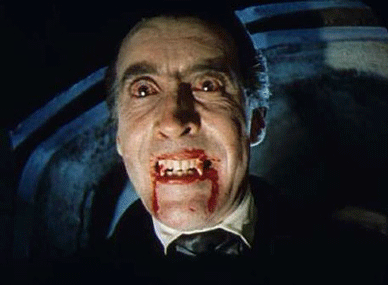only magazine
↵ home
Why Vampires Suck

By Adam Thomas
Wednesday October 31, 2007
It’s rough these days if you’re a blood sucker in the movies. The modern world hasn’t been kind to those cursed to lurk in the shadows. If the strength of any horror mythology exists in its relevance as allegory, offering dark reflections of ourselves and the climate of the world we live in, then maybe today, vampires are no longer needed. Once held as the ruling cause of nightmares, vampires have traditionally had great power for the introspective self examination towards our darkest desires. They are our dark mirrors, closer to us than werewolves, more human less animal, tragically bound to an eternity of blood letting, haunted by hunger and forever forbidden from seeing the light of day. But while their legacy lives in their ability to reflect our forbidden urges, in today’s political climate this has less resonance with the terrifying realities that preoccupy our collective consciousness.
Unfortunately from Blade to Underworld, and especially in the new box office bloodsucker 30 Days of Night, vampire’s have become little more than gangs of leather clad bikers and ragtag misfits without soul, conscience and character. The latter offers little else but a run-and-hide-and-do-something-stupid zombie movie, but just with vampires. Either that or they get played for laughs. But it wasn’t always so. As far back as 1922, German filmmaker F.W. Murnau crafted the first haunting images of the un-dead with his silent classic Nosferatu. Actor Max Shreck’s bald and rat-face visage gave a frightening depth to a character torn from the pages of Bram Stoker’s 1897 novel. The best vampire films have always been the ones that expand on the simple myths, that enlarge the blood sucking arena and drag our most human aspects into the shadows. It’s a world after sun down, where classic and cult films like Lost Boys and Near Dark can take the notion of the internal struggle to remain human and bring it home by exploring the notions of alienation and individuality, youthful rebellion and even family — all intrinsic aspects of how we fit into the world and how we define the values of our own morality. Where cinematic re-workings like Werner Herzog’s 1979 Nosferatu engaged in exploring the vampire’s cursed sense of lingering humanity, the recent template towards the fanged blood feeders has by and large robbed them of their relevance, rendering them little more than cartoonish serial killers in need of a bib and a serious dental plan.
Culturally, our preoccupation with the morbid and the gothic found new footing through the ’80s and’ 90s, turning vampires into ancient ambassadors that played to our sense of a bleak and doomed future. The dangerous themes of unbridled sexuality and all of its fluids took on an even more ominous tone with the arrival of the AIDS epidemic that began to bring about the death of millions. The sexuality and eroticization in films like The Hunger works to parallel this tide where the deadly results playing out in the bodies of the vampire’s victims remind us of the deathly gaunt reality of the HIV virus being spread around the world. But those were moody, broody times, and we are a long way from them now. The time for internal examination has given way to the external fear of a world unhinged. The selective stalking of a few vampires feeding on our blood now pales in comparison to the real terror of suicide bombers, constant war,conservatism and the possibility of nuclear catastrophe. Even films like Hostel and Saw now better occupy the frightening possibilities of mans inhumanity to man, where we are the real monsters and we don’t need all the fangs and pointed ears.
The vampires of yesteryear evoked a cursed yet romantic twist on the darkness within. While they fed on blood, they were in their fullest incarnations vaguely human, and at best tragic alter-egos of the outsider in all of us. Today, torture porn and the “shock and awe” of the real world provide the widespread madness, chaos and fear denied by secretive clans of vampires. There are no more rules of etiquette. There is no more room for romance. In the face of a rapidly deteriorating planet – a world on the verge of panic – we no longer look inside to see the horror in our hearts or the evil coursing through our veins; we look outwards and see it everywhere else. The time for vampires has passed. The class of the past is gone. Bring in the zombies.
